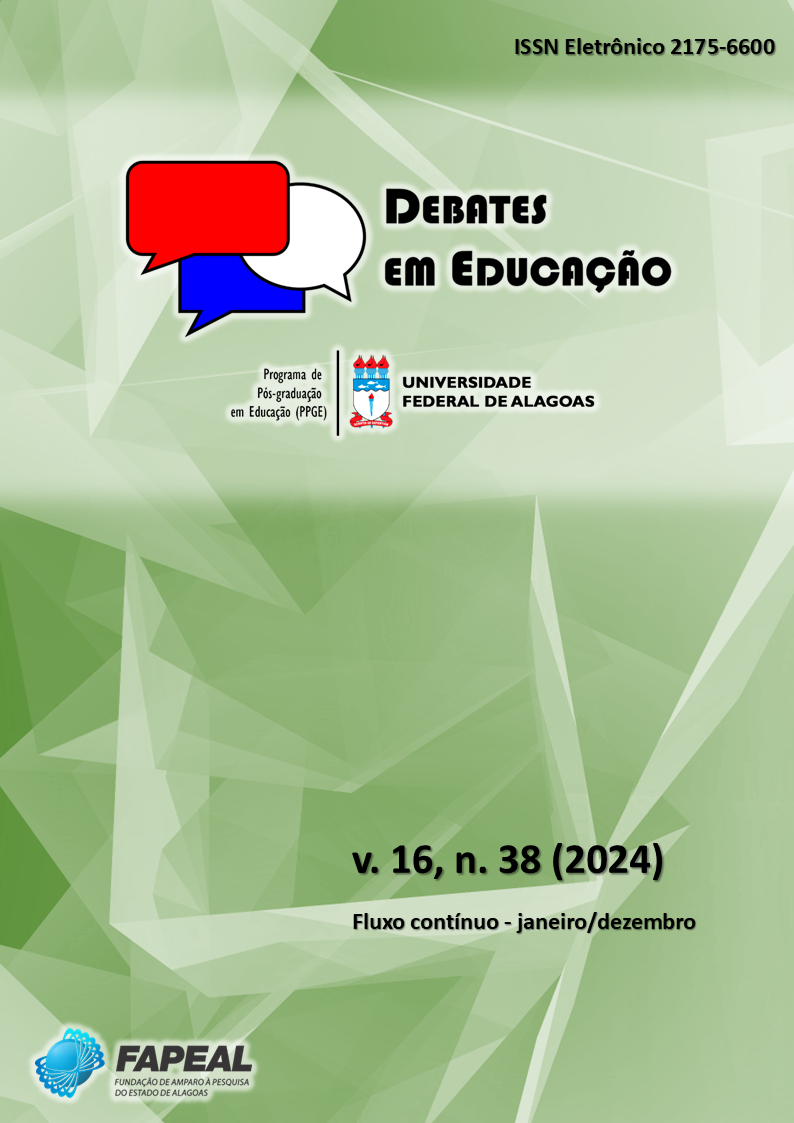From idealized education to possible education through the diversity of brazilian reality(ies)
DOI:
https://doi.org/10.28998/2175-6600.2024v16n38pe16496Keywords:
UNESCO, Sustainable development goal 4 (SDG4), Goal IV of the national education plan, Quality Education, InclusionAbstract
There is a global and national consensus on the need for collective reinvention to promote a fairer and more sustainable future and education is of primary importance in this process. To transform schools into protected, inclusive educational places that promote equity and individual and collective well-being, it is necessary to rethink current education to transform the world into a more fair, equitable and sustainable place. The challenges of implementing and improving education are proportional to the diversity of the Brazilian reality. The work in question proposes to carry out documentary research following the establishment of Brazilian goals and their strategies. Through a comparative study, we identified the strategies described in the global context based on UNESCO guidelines in relation to national ones, described in the Brazilian indicators of Sustainable Development Goals 4 (SDG4) and finally, we associated inclusion, foreseen in Goal IV of the Plan National Education. We conclude that Brazilian goals are aligned with global propositions, with the necessary adjustments based on their economic, political and social resources.
Downloads
References
BRASIL. Ministério da Educação. UNESCO. Disponível em: http://portal.mec.gov.br/encceja-2/480-gabinete-do-ministro-1578890832/assessoria-internacional-1377578466/20747-unesco Acesso em: 05 out. 2022.
BRASIL. Indicadores Brasileiros para os Objetivos de Desenvolvimento Sustentável Site operado em conjunto pelo IBGE - Instituto Brasileiro de Geografia e Estatística e pela Secretaria Especial de Articulação Social Disponível em: https://odsbrasil.gov.br Acesso em: 05 out. 2022.
BRASIL. INEP. INSTITUTO NACIONAL DE ESTUDOS E PESQUISAS EDUCACIONAIS ANÍSIO TEIXEIRA. Plano Nacional de Educação – LEI N° 13.005/2014 PNE 2014-2024: Linha de Base. – Brasília, DF: Inep, 2015. Disponível em: https://pne.mec.gov.br/18-planos-subnacionais-de-educacao/543-plano-nacional-de-educacao-lei-n-13-005-2014 Acesso em: 08 out. 2022.
BRASIL. INEP. INSTITUTO NACIONAL DE ESTUDOS E PESQUISAS EDUCACIONAIS ANÍSIO TEIXEIRA (INEP). Índice de Desenvolvimento de Educação Básica. 2022. Disponível em: https://www.gov.br/inep/pt-br/areas-de-atuacao/pesquisas-estatisticas-e-indicadores/ideb. Acesso em: 15 out. 2022.
BRASIL. UNESCO. Educação 2030 no Brasil. Disponível em: https://pt.unesco.org/fieldoffice/brasilia/expertise/education-2030-brazil Acesso em: 05 out. 2022.
BRASIL. Lei Federal 13.005, de 25 de junho de 2014. Aprova o Plano Nacional de Educação - PNE e dá outras providências. Brasília, DF. Disponível em: http://www.http://pne.mec.gov.br/ Acesso em: 08 out. 2022.
BRASIL, Ministério da Educação / Secretaria de Articulação com os Sistemas de Ensino (MEC/ SASE). Planejando a Próxima Década: Conhecendo as 20 Metas do Plano Nacional de Educação. 2014. Disponível em: http://pne.mec.gov.br/images/pdf/pne_ conhecendo_20_metas.pdf.
Acesso em: 08 out. 2022.
CASTILLO, S. Resenha do texto Reimaginar Juntos Nuestros Futuros: Un nuevo contrato social para la educación. 2021.Disponível em: https://oidel.wordpress.com/2021/12/16/reimaginar-juntos-nuestros-futuros-un-nuevo-contrato-social-para-la-educacion/ Acesso em: 08 Out. 2022.
COSSETIN, M.; DOMICIANO, C.; FIGUEIREDO, I. (2021). A UNESCO E A DECLARAÇÃO DE INCHEON: O Protagonismo Do Setor Privado Na Agenda Mundial Para Educação 2030. Revista Educere Et Educare, Vol. 15, N. 37 (2020) Out/Dez. 2020. Ahead of Print. DOI: 10.17648/ educare.v15i37.24389 Disponível em: https://www.researchgate.net/publication/349399464_A_UNESCO_E_A_DECLARACAO_DE_INCHEON_O_PROTAGONISMO_DO_SETOR_PRIVADO_NA_AGENDA_MUNDIAL_PARA_EDUCACAO_2030 Acesso em: 05 out. 2022.
FERNANDES, E. DELOU. C. Planos Municipais de Educação do Rio De Janeiro: Análise Comparativa da Meta IV do Plano Nacional de Educação. Hypatia: Rio de Janeiro, 2021. Vol. 1
FERREIRA, A., MADEIRA, L. Análise do PME e do Relatório de Monitoramento do Município de Duas Barras: Enfoque Na Meta 4 do PNE. In: Planos Municipais de Educação do Rio De Janeiro: Análise Comparativa da Meta IV do Plano Nacional de Educação. Hypatia: Rio de Janeiro, 2021. Vol. 1
IBGE. INSTITUTO BRASILEIRO DE GEOGRAFIA ESTATÍSTICA. Disponível em: IBGE | Portal do IBGE | IBGE Acesso em: 15 out. 2022
UNESCO; Boadilla del Monte. Reimaginar nossos futuros juntos: um novo contrato social para a educação. Brasília: Comissão Internacional sobre os Futuros da Educação: Fundación SM, 2022. ISBN: 978-65-86603-23-1 (digital) Disponível em: https://unesdoc.unesco.org/ark:/48223/pf0000381115.locale=en Acesso em: 05 out. 2022.
UNESCO. Educação para os Objetivos de Desenvolvimento Sustentável: Objetivos de aprendizagem. Educação 2030. Publicado em 2017 pela Organização das Nações Unidas para a Educação, a Ciência e a Cultura, 7, place de Fontenoy, 75352 Paris 07 SP, França, e Representação da UNESCO no Brasil. © UNESCO 2017 ISBN: 978-85-7652-218-8 Disponível em: https://unesdoc.unesco.org/ Acesso em: 08 out. 2022.
UNDP. Objetivos de Desenvolvimento Sustentável. Programa das Nações Unidas para o Desenvolvimento. 2015 Disponível em: https://www.undp.org/sustainable-development-goals Acesso em: 08 out. 2022.
Downloads
Published
How to Cite
Issue
Section
License
Copyright (c) 2024 Debates em Educação

This work is licensed under a Creative Commons Attribution-NonCommercial 4.0 International License.
Neste tipo de licença é permitido Compartilhar (copiar e redistribuir o material em qualquer suporte ou formato) e Adaptar (remixar, transformar, e criar a partir do material). Deverá ser dado o crédito apropriado , prover um link para a licença e indicar se mudanças foram feitas . O conteúdo não pdoerá ser utilizado para fins comerciais .
Atribuição-NãoComercial 4.0 Internacional Creative Commons Attribution 4.0 (CC BY-NC 4.0).

